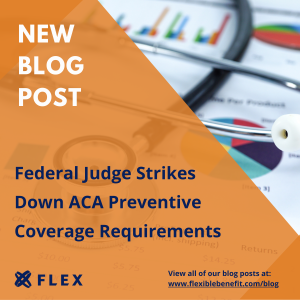Benefits Buzz
Federal Judge Strikes Down ACA Preventive Coverage Requirements

On March 30, 3023, U.S. District Judge Reed O’Connor issued a ruling that health insurance plans are not required to cover many preventive services, nor are the plans required to cover many preventive services cost-free to members. Preventive service coverage requirements have been required as a provision of the Affordable Care Act (ACA) since 2010.
On September 7, 2022, Judge O’Connor, a federal judge in Texas, ruled that health insurance plans did not have to cover HIV preexposure prophylaxis (PrEP) pills because it violated religious freedom rights, but he left other preventive service coverage requirements in place pending further evaluation and review.
Last week, Judge O’Connor ruled that preventive services recommended by the U.S. Preventive Services Task Force (PSTF) need not be covered by health insurance plans. Among the services affected are screenings for breast cancer, colorectal cancer, cervical cancer and lung cancer, diabetes screenings, various screenings for women who are pregnant, statin use to prevent cardiovascular disease, vision screenings for children, and more.
The PSTF has been recommending many preventive services that should be covered by health insurance plans that are subject to the ACA. Members of the PSTF are comprised of a group of 16 scientists and doctors and are appointed by the Department and Health and Human Services (HHS). Judge O’Connor ruled that only officials appointed directly by the President of the United States have the authority to recommend preventive coverage requirements. In other words, the judge’s ruling says the PSTF does not have the legal authority to mandate which preventive services should be covered by health insurance plans.
The ruling will likely have little impact to health insurance plans in 2023. Insurance coverage contracts generally run at least through the end of the year. The Biden administration is also expected to appeal Judge O’Connor’s ruling, which means there is still a possibility that a higher court will overturn the decision.
It’s also unclear what changes insurance carriers might make if the ruling isn’t overturned. On one hand, there is a cost to covering preventive services. On the other hand, there are savings when medical conditions can be prevented or detected early.

